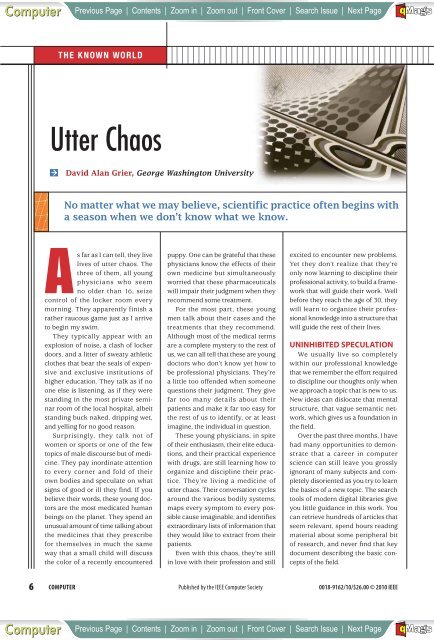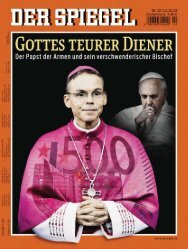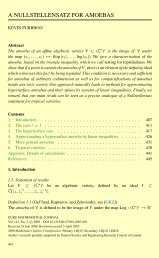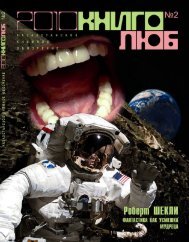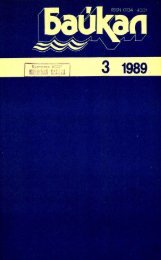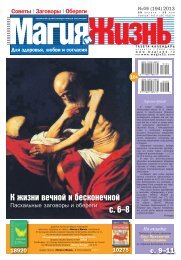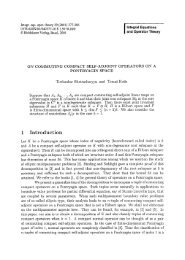computing lives - FTP Directory Listing
computing lives - FTP Directory Listing
computing lives - FTP Directory Listing
You also want an ePaper? Increase the reach of your titles
YUMPU automatically turns print PDFs into web optimized ePapers that Google loves.
A<br />
Computer Previous Page | Contents | Zoom in | Zoom out | Front Cover | Search Issue | Next Page M S BE<br />
aG<br />
F<br />
6<br />
THE KNOWN WORLD<br />
Utter Chaos<br />
As far as I can tell, they live<br />
<strong>lives</strong> of utter chaos. The<br />
three of them, all young<br />
physicians who seem<br />
no older than 16, seize<br />
control of the locker room every<br />
morning. They apparently finish a<br />
rather raucous game just as I arrive<br />
to begin my swim.<br />
They typically appear with an<br />
explosion of noise, a clash of locker<br />
doors, and a litter of sweaty athletic<br />
clothes that bear the seals of expensive<br />
and exclusive institutions of<br />
higher education. They talk as if no<br />
one else is listening, as if they were<br />
standing in the most private seminar<br />
room of the local hospital, albeit<br />
standing buck naked, dripping wet,<br />
and yelling for no good reason.<br />
Surprisingly, they talk not of<br />
women or sports or one of the few<br />
topics of male discourse but of medicine.<br />
They pay inordinate attention<br />
to every corner and fold of their<br />
own bodies and speculate on what<br />
signs of good or ill they find. If you<br />
believe their words, these young doctors<br />
are the most medicated human<br />
beings on the planet. They spend an<br />
unusual amount of time talking about<br />
the medicines that they prescribe<br />
for themselves in much the same<br />
way that a small child will discuss<br />
the color of a recently encountered<br />
COMPUTER<br />
David Alan Grier, George Washington University<br />
No matter what we may believe, scientific practice often begins with<br />
a season when we don’t know what we know.<br />
puppy. One can be grateful that these<br />
physicians know the effects of their<br />
own medicine but simultaneously<br />
worried that these pharmaceuticals<br />
will impair their judgment when they<br />
recommend some treatment.<br />
For the most part, these young<br />
men talk about their cases and the<br />
treatments that they recommend.<br />
Although most of the medical terms<br />
are a complete mystery to the rest of<br />
us, we can all tell that these are young<br />
doctors who don’t know yet how to<br />
be professional physicians. They’re<br />
a little too offended when someone<br />
questions their judgment. They give<br />
far too many details about their<br />
patients and make it far too easy for<br />
the rest of us to identify, or at least<br />
imagine, the individual in question.<br />
These young physicians, in spite<br />
of their enthusiasm, their elite educations,<br />
and their practical experience<br />
with drugs, are still learning how to<br />
organize and discipline their practice.<br />
They’re living a medicine of<br />
utter chaos. Their conversation cycles<br />
around the various bodily systems,<br />
maps every symptom to every possible<br />
cause imaginable, and identifies<br />
extraordinary lists of information that<br />
they would like to extract from their<br />
patients.<br />
Even with this chaos, they’re still<br />
in love with their profession and still<br />
excited to encounter new problems.<br />
Yet they don’t realize that they’re<br />
only now learning to discipline their<br />
professional activity, to build a framework<br />
that will guide their work. Well<br />
before they reach the age of 30, they<br />
will learn to organize their professional<br />
knowledge into a structure that<br />
will guide the rest of their <strong>lives</strong>.<br />
UNINHIBITED SPECULATION<br />
We usually live so completely<br />
within our professional knowledge<br />
that we remember the effort required<br />
to discipline our thoughts only when<br />
we approach a topic that is new to us.<br />
New ideas can dislocate that mental<br />
structure, that vague semantic network,<br />
which gives us a foundation in<br />
the field.<br />
Over the past three months, I have<br />
had many opportunities to demonstrate<br />
that a career in computer<br />
science can still leave you grossly<br />
ignorant of many subjects and completely<br />
disoriented as you try to learn<br />
the basics of a new topic. The search<br />
tools of modern digital libraries give<br />
you little guidance in this work. You<br />
can retrieve hundreds of articles that<br />
seem relevant, spend hours reading<br />
material about some peripheral bit<br />
of research, and never find that key<br />
document describing the basic concepts<br />
of the field.<br />
Published by the IEEE Computer Society 0018-9162/10/$26.00 © 2010 IEEE<br />
A<br />
Computer Previous Page | Contents | Zoom in | Zoom out | Front Cover | Search Issue | Next Page M S BE<br />
aG<br />
F


